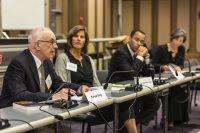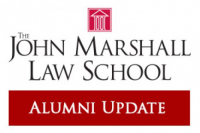
As published by CNBC
Law professors from across the country gathered at The John Marshall Law School this past weekend for the Society of American Law Teachers conference on social justice.
The conference, which focused on pedagogical techniques to bring social justice into the law school curriculum, offered over 40 panels on the topic.
“The conference resulted in a robust discussion of the legal academy’s role in addressing social justice issues both within and outside of the classroom. John Marshall Law School provided an ideal forum in light of our emphasis on integrating practice based-skills throughout our curriculum and offering our students meaningful opportunities to provide quality legal assistance to those in need,” said John Marshall Associate Professor Hugh Mundy who is a nominee for SALT’s Board of Governors and helped organize the conference.
Numerous John Marshall professors served as panelists during the two-day event, including:
Professor Celeste Hammond, director of the law school’s Center for Real Estate Law, who spoke about protecting tenants in foreclosed rental properties.
Assistant Professor Mary Nagel, the law school’s director of Externships, and Assistant Professor Jaime Kleppetsch, the associate director of John Marshall’s Academic Achievement Program, who spoke about the practical application of social justice in doctrinal classes.
Professor Kim Chanbonpin, who is the director of John Marshall’s Lawyering Skills Program, along with Clinical Professor J. Damian Ortiz, who is director of John Marshall’s Pro Bono Program & Clinic, and Sarah Davila-Ruhaak, who is the co-director of John Marshall’s International Human Rights Clinic, presented on the synergies of legal writing, skills and clinical teaching.
Professor Debra Pogrund Stark, who is the director of John Marshall’s Domestic Violence Clinical Advocacy Program, discussed innovative methods to pursue social justice in a law school clinic, while Professor Mark E. Wojcik spoke about social justice and the legal writing classroom.
Professor Michael Seng, the co-executive director of John Marshall’s Fair Housing Legal Support Center & Clinic, and the Hon. Sheila Murphy, co-director of John Marshall’s Restorative Justice Project, discussed restorative justice in a panel titled “Bringing Justice to Our Conviction and Sentencing Practice”.
Clinical Professor Cynthia Bond, whose work focuses on the use of pop culture as a pedagogical tool in the law school classroom, gave a talk titled “To Kill a Lawyer-Hero: Atticus Finch in the Law School Classroom” in a panel discussion devoted to inspiring social justice careers.

